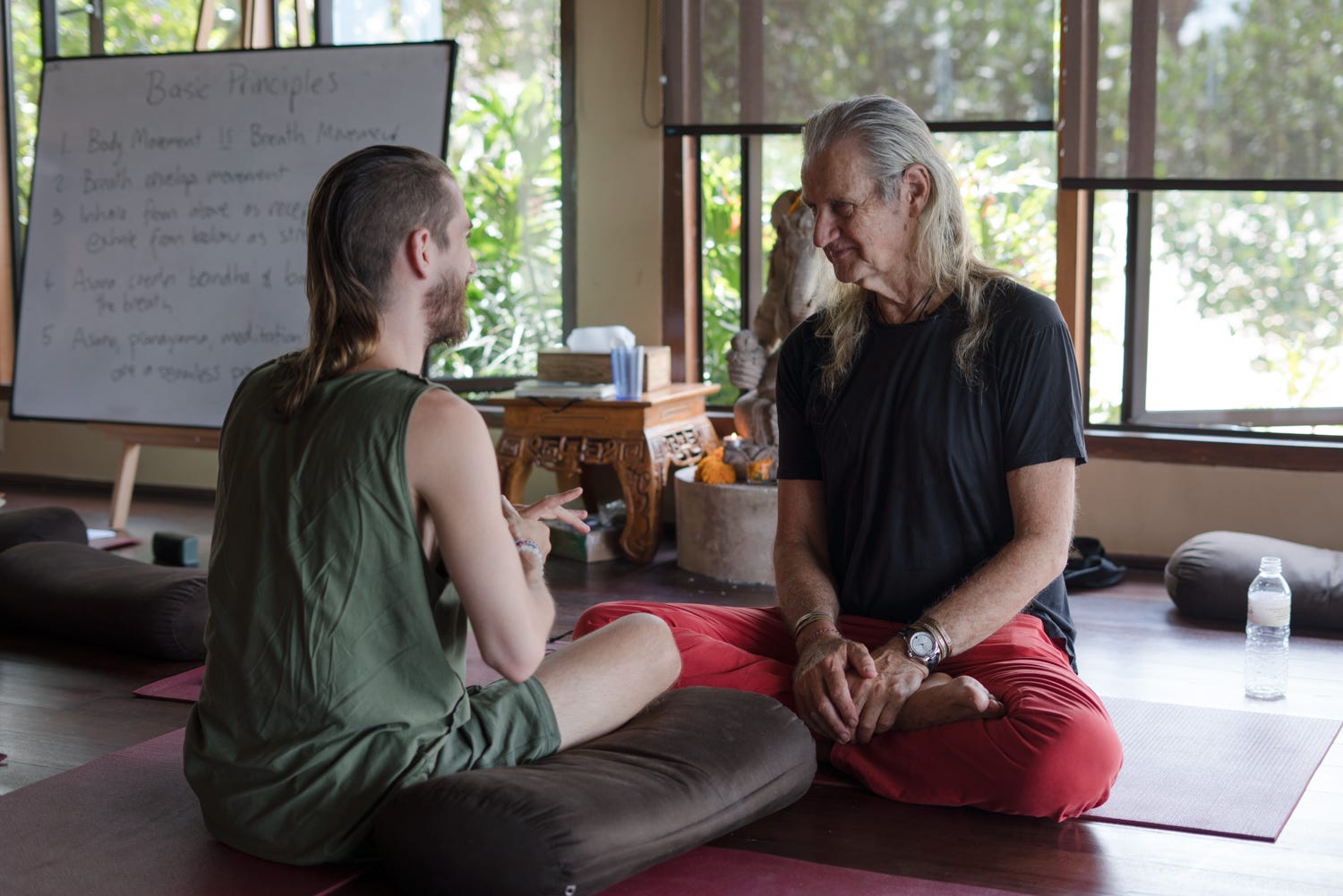Atha Yoga! You Are Here Now | Mark Whitwell
Consider the first two words from Pantanjali’s Yoga Sutra: Atha Yoga, or “Here now.” They do not mean, “Be here now.” They mean, “You are here now.” The difference is everything. You have been taught that you need to “find” truth, but seeking denies you the perfection that you already are, the wonder of your present reality. Stop seeking, stop searching, start living, start loving.
When you practice yoga in the way that is right for you — your body type, your age and health — then the tantra is given. There is no tantra without hatha yoga, where every form of mutuality inherent in the body is acknowledged and felt. The intimacy with body and breath gives us the yoga of mutuality and the ability to feel, and when we practice it there is no end to the depth of our feeling. Embracing our experience, we embrace one another and the Source of life.
Understanding the social landscape and the handicap we start with can help us make a difference. To this day, tantric practices have been kept secret because sex and feminine wisdom are suppressed and degraded by religious and political orthodoxies.
All around the world this repression sows hypocrisy, conflict, and confusion in society. No wonder finding and maintaining relationship and mutuality is so difficult! Personal, family, and public health depend on ending the imagined separation of male and female, Source and seen.
The embrace of man and woman, heaven and earth, heals and moves energy. By participating with an apparent opposite, we find an equal, a source of strength, and an opportunity to receive: I am you, and you are me. This awareness through yoga can end the patterns of sex negativity, denial and exploitation and allow us to explore the wonder of union within and without.
Yoga also corrects socially imposed limitations on gender function and qualities through the male-female union developed within and between our bodies. In surrendering to the feminine within and without, we bring forth our partner’s strength, energy, wisdom, and insight.
The woman’s ability to be strong and penetrate the world develops without sacrificing her femininity, and a man’s receptivity grows without any loss of masculinity. A yogi slips the straitjacket of stereotyped gender roles. U.G. Krishnamurti used to say, “A yogi is genderless,” because in a real yogi both genders are entirely active.
In my own life, I have felt how a daily asana practice helps made me stronger and more sensitive to myself and to others. The receptive aspects of my systems flourish, allowing the quality and skill of relationship to spontaneously arise.
I have seen so many people all over the world whose commitment to a daily practice has enabled them to find appropriate relationships, commit to them, and explore them deeply. They become devoted to relationship despite the personal and interpersonal difficulties that are a part of life.
About those difficulties: it’s important to realize that relationship, and its nurturing through yoga, is wonderful, essential, but not a state of perpetual bliss! That very expectation implies the idea that we lack something. The natural difficulties of life are part of the experience we embrace.
They have their place in the grand context of love and nurturing that is life, and so we feel them rather than deny them as some shameful sign of spiritual failure. Love deepens our ability to feel; hence in the embrace of life we necessarily feel the pain of life. But it is in this way that compassion and caring, our natural response, become the very purpose of life.
Remember that, whatever the tangled machinations of man’s fearful mind, in nature there is perfect union — and we are of nature. No matter how bad things get, no matter the carnage caused by those who feel separate, it is possible to make a place for ourselves on this earth.
As in war-torn countries the birds still sing in the fields, we can always practice what is natural to life; this is the final revolution. We can personally achieve it now because it is already true.
In loving God and sex, and in knowing that we are utterly loved, we create and come to share a practical response to suffering. When we enjoy direct intimacy with life, the healing force seeps through gradually, even if we don’t notice it right away.
Then, logically, we want to share this intimacy with others. Our intimate relationships make us stronger and wiser as we receive the strong and subtle energies that come flowing through. It is an infinite exchange, with infinite possibilities, and in time it will dramatically change the world.
Cutting through the social mind to establish complete intimacy can perhaps be seen as the spiritual task of our age. It is certainly as challenging as any spiritual mission that has come before. But it is within your grasp, because it is the natural condition of our life, and you can feel it now.
Have the courage to know that there’s no such thing as “enlightenment.” There’s just Life, and you are there.


Comments
Post a Comment